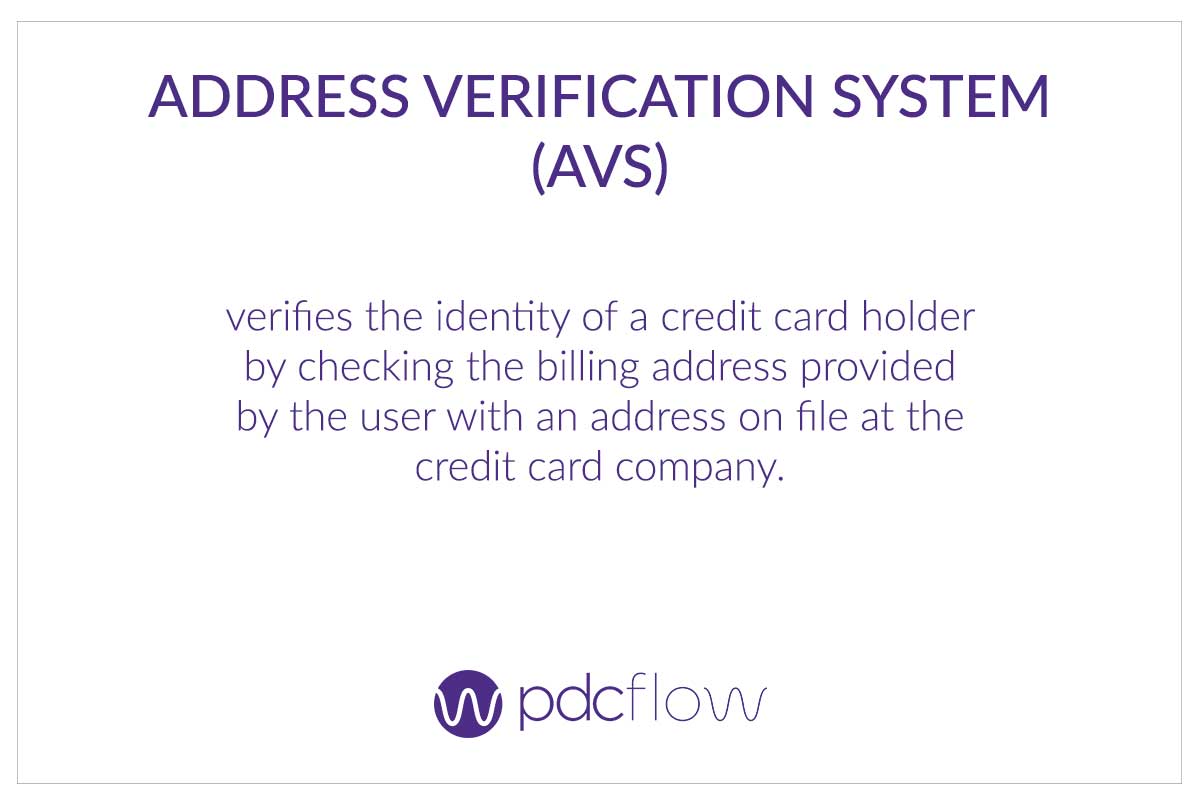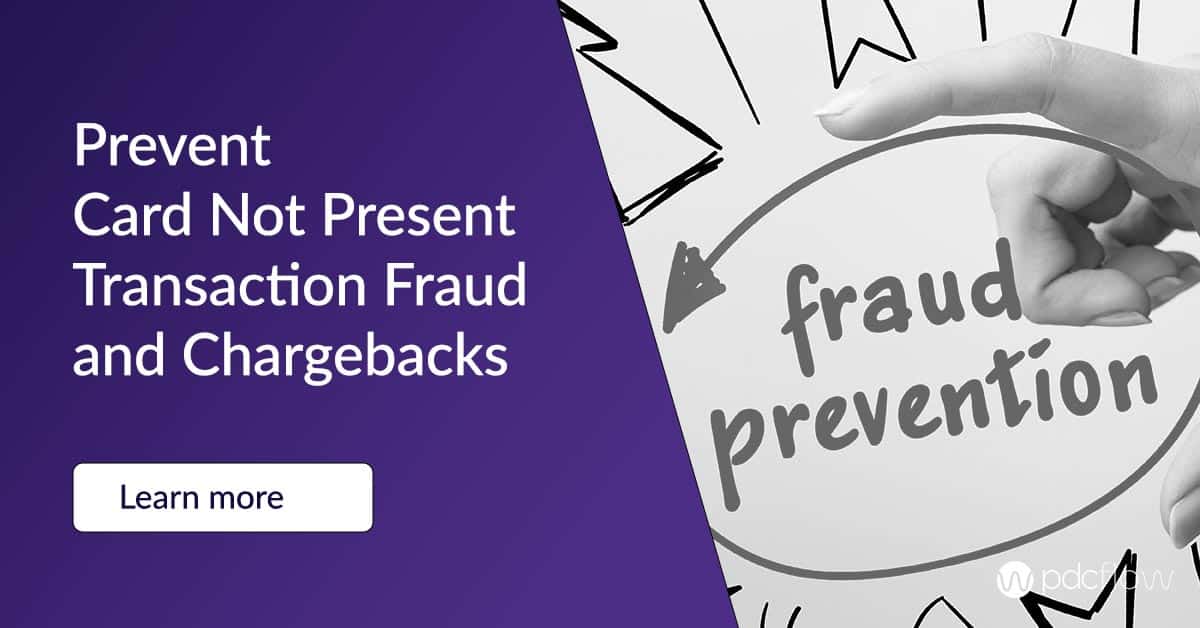Self-pay options increase revenue and improve the customer experience. But online payments can attract scammers too. Following basic credit card fraud prevention measures keeps both your business and your customers safe.
Depending on the online payment portal your company uses, preventing credit card fraud can be mostly automated. However, your business should still understand these basic best practices on how to prevent credit card fraud.

Address Verification Service (AVS)
The Address Verification Service (AVS) used by most major credit card brands can match a card number to its billing address. When possible, you should make the cardholder’s address a required field for credit card payments.
Having address information is important as a credit card fraud prevention (and investigation) tool and can assist in the event of a chargeback.
In addition, capturing address information will qualify transactions for a significantly lower merchant processing rate, taking it from non-qualified to mid-qualified on a card not present transaction.
Your payment software must collect and submit address information for this lower rate but a match is not required to qualify.
When Valid Transactions Fail AVS Match
There may be other reasons besides fraud that cause an AVS to fail. When this is the case, your payment software will still process transactions regardless of the AVS result. Other reasons an AVS result might fail for a valid transaction:
- The AVS system could be experiencing problems and may be temporarily down
- The card may not be found in the AVS system
- The consumer recently moved and card information hasn’t been updated in the AVS system
Security Codes for Credit Card Fraud Prevention
The three- or four-digit security code on a credit card is an added layer of fraud prevention. This code goes by many names. A few of the most common are:
- Card Verification Value (CVV)
- Card Security Code (CSC)
- Card Verification Code (CVC)
- Card Identification (CID)
Depending on your payment software, the name for this piece of information may be listed differently.
Make sure you know the terminology your vendor uses, so you can have informed conversations with customers about the information you require during payment and why it’s so important.
You should require customers to enter their card security code during any card transaction to add another layer of protection to your online payments.
Your payment processing software may allow the security code as an optional field during employee-initiated payments. But many solutions will enforce entering a CVV to stop credit card fraud from happening on your online payment portal.

How Do AVS and CVV Prevent Fraud?
If you never see the person making a card payment on your website, how do you know who they are? The more information you require to prove a customer’s identity, the safer your online payment environment will be.
Asking for an address and security code when you take payments online are simple precautions that help you protect your company against fraud and stop unauthorized use of stolen card data.
This method is effective for credit card fraud prevention because while scammers can get stolen credit card numbers to use online, it’s harder for them to gather more information related to these cards – especially a CVV.
PCI Compliance to Prevent Credit Card Fraud
Every merchant that accepts credit cards needs to follow Payment Card Industry (PCI) compliance rules to keep consumer information safe during a transaction.
Security codes are a strong tool against online payment fraud because PCI compliance standards say these codes can not be stored in your credit card payment processing system after they are used to authorize a transaction.
Because security codes should never be stored alongside card numbers, it’s harder for bad actors to find and misuse this information (giving you more assurance that payments using a CVV are legitimate).
Reducing Chargebacks
Acquiring an address and security code can also protect merchants in the event of a chargeback. When you ask customers to provide this information during an online transaction, your payment software should provide a report detailing whether or not the data was a match.
For instance, PDCflow captures and stores transaction reports so our users can use positive AVS or CVV matches to prove a consumer initiated their online transaction.
PDCflow’s Credit Card Fraud Prevention Measures
For those looking for ways to prevent credit card fraud, PDCflow offers AVS and CVV fields that can be turned on or off at the administrative level. Depending on your business needs, you may change your settings based on whether you’re taking payments via payment portal or live agent.
PDCflow’s software can also reduce a company’s PCI compliance responsibilities through Flow Technology, which delivers payment requests directly to a customer, so they key in their own sensitive data.
Through Flow, agents will never need to see or hear credit card numbers, and the information will never be stored in your company’s systems of record, keeping payment data safe from breaches.
Card Verify
Along with protection for one-time payments, PDCflow offers protection for merchants who offer recurring payment schedules to customers. When an entire payment schedule is derailed by bad card information, it can be frustrating and costly to fix.
PDCflow’s Card Verify feature offers fraud prevention for payment schedules by making sure a card is valid before the first payment is processed. Card data that may be validated includes:
- Card number
- Card expiration date
- Street address and postal code
- Card security code

Secure Entry Overlay for Online Credit Card Payments
Using PDCflow’s online payment center protects customer credit card information and reduces PCI scope for companies through patented Secure Entry Overlay Technology.
The payment data entered online is never stored on your server. Because PDCflow is a Level 1 PCI Compliant payment processor, our system stores, encrypts and tokenizes this information – keeping your consumer credit card data safe and reducing your company’s PCI responsibilities.
PDCflow payment processing puts you in control of these requirements and provides you the added protection of secure entry overlay for your online credit card payments.
Learn more about PDCflow’s customizable online payment portals and other security and protection features. Request a demo today.





